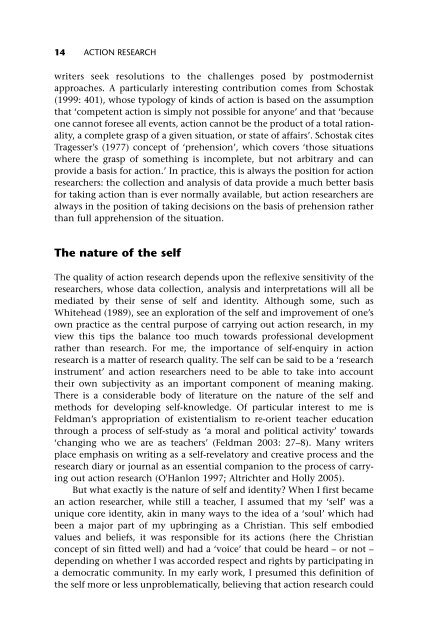Action Research A Methodology for Change and Development
Action Research A Methodology for Change and Development
Action Research A Methodology for Change and Development
Create successful ePaper yourself
Turn your PDF publications into a flip-book with our unique Google optimized e-Paper software.
14 ACTION RESEARCH<br />
writers seek resolutions to the challenges posed by postmodernist<br />
approaches. A particularly interesting contribution comes from Schostak<br />
(1999: 401), whose typology of kinds of action is based on the assumption<br />
that ‘competent action is simply not possible <strong>for</strong> anyone’ <strong>and</strong> that ‘because<br />
one cannot <strong>for</strong>esee all events, action cannot be the product of a total rationality,<br />
a complete grasp of a given situation, or state of affairs’. Schostak cites<br />
Tragesser’s (1977) concept of ‘prehension’, which covers ‘those situations<br />
where the grasp of something is incomplete, but not arbitrary <strong>and</strong> can<br />
provide a basis <strong>for</strong> action.’ In practice, this is always the position <strong>for</strong> action<br />
researchers: the collection <strong>and</strong> analysis of data provide a much better basis<br />
<strong>for</strong> taking action than is ever normally available, but action researchers are<br />
always in the position of taking decisions on the basis of prehension rather<br />
than full apprehension of the situation.<br />
The nature of the self<br />
The quality of action research depends upon the reflexive sensitivity of the<br />
researchers, whose data collection, analysis <strong>and</strong> interpretations will all be<br />
mediated by their sense of self <strong>and</strong> identity. Although some, such as<br />
Whitehead (1989), see an exploration of the self <strong>and</strong> improvement of one’s<br />
own practice as the central purpose of carrying out action research, in my<br />
view this tips the balance too much towards professional development<br />
rather than research. For me, the importance of self-enquiry in action<br />
research is a matter of research quality. The self can be said to be a ‘research<br />
instrument’ <strong>and</strong> action researchers need to be able to take into account<br />
their own subjectivity as an important component of meaning making.<br />
There is a considerable body of literature on the nature of the self <strong>and</strong><br />
methods <strong>for</strong> developing self-knowledge. Of particular interest to me is<br />
Feldman’s appropriation of existentialism to re-orient teacher education<br />
through a process of self-study as ‘a moral <strong>and</strong> political activity’ towards<br />
‘changing who we are as teachers’ (Feldman 2003: 27–8). Many writers<br />
place emphasis on writing as a self-revelatory <strong>and</strong> creative process <strong>and</strong> the<br />
research diary or journal as an essential companion to the process of carrying<br />
out action research (O'Hanlon 1997; Altrichter <strong>and</strong> Holly 2005).<br />
But what exactly is the nature of self <strong>and</strong> identity? When I first became<br />
an action researcher, while still a teacher, I assumed that my ‘self’ was a<br />
unique core identity, akin in many ways to the idea of a ‘soul’ which had<br />
been a major part of my upbringing as a Christian. This self embodied<br />
values <strong>and</strong> beliefs, it was responsible <strong>for</strong> its actions (here the Christian<br />
concept of sin fitted well) <strong>and</strong> had a ‘voice’ that could be heard – or not –<br />
depending on whether I was accorded respect <strong>and</strong> rights by participating in<br />
a democratic community. In my early work, I presumed this definition of<br />
the self more or less unproblematically, believing that action research could

















